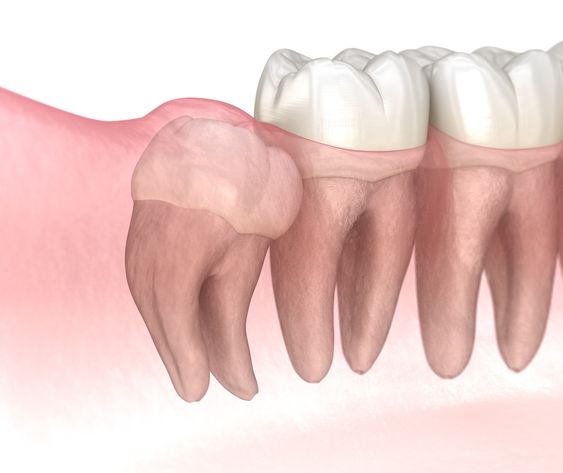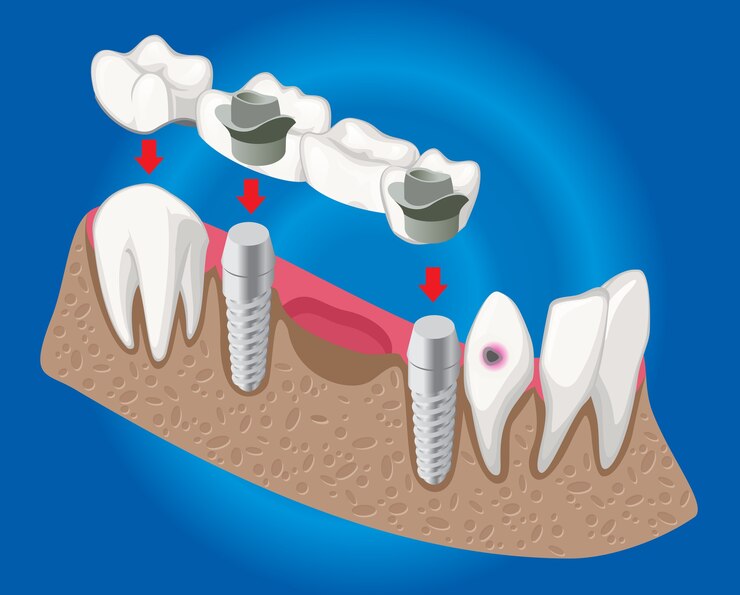Wisdom Teeth Removal In Adults: A Comprehensive Guide
The final pair of molars in the back of the mouth are the wisdom teeth, sometimes referred to as third molars. While they can be beneficial when healthy and properly aligned, more often than not, these molars pose challenges, leading to the need for extraction in many adults. This comprehensive guide aims to provide valuable insights into the reasons for wisdom teeth removal in adults, the procedure itself, and the essential aspects of recovery.Best Dental Clinic In Greater Noida West
I. Understanding Wisdom Teeth
Wisdom teeth typically emerge in late adolescence or early adulthood, between the ages of 17 and 25. The evolutionary purpose of these molars was to aid our ancestors in grinding and chewing tough, raw foods. However, due to changes in diet and evolution, many people no longer have sufficient jaw space for these additional molars, leading to various issues.
II. Reasons for Wisdom Teeth Removal:
Impaction:
Wisdom teeth often become impacted, meaning they do not fully emerge through the gums. This can cause pain, swelling, and infection. Impacted wisdom teeth may also lead to damage to nearby teeth and structures.
Misalignment:
Even if wisdom teeth manage to emerge, they may not align properly with the existing teeth. This misalignment can result in bite problems, crowding, and difficulty maintaining proper oral hygiene.
Infection and Gum Disease:
The wisdom teeth are difficult to adequately clean since they are positioned toward the back of the mouth. As a result, they are more susceptible to gum disease and infections, which can lead to pain and swelling.
Cysts and Tumors:
Cysts or tumors may sometimes form in wisdom teeth. These abnormal growths can cause damage to the jawbone and surrounding teeth, necessitating prompt removal.
III. Signs and Symptoms of Wisdom Teeth Issues
Recognizing the signs of potential problems with wisdom teeth is crucial for timely intervention. Common symptoms include:
Pain or Discomfort: Persistent pain or discomfort in the back of the mouth.
Swelling and Redness: Swollen, red, or tender gums in the back of the mouth.
Difficulty Opening Mouth: Limited jaw movement or difficulty opening the mouth fully.
Bad Breath: Foul breath despite good oral hygiene practices.
IV. The Procedure: What to Expect During Wisdom Teeth Removal
Consultation and Examination:
Before the extraction, a dentist or oral surgeon will conduct a thorough examination, often including X-rays, to assess the position of the wisdom teeth and determine the best course of action.
Anesthesia Options:
Depending on the complexity of the extraction and the patient’s preference, various anesthesia options are available. Local anesthesia, sedation, or general anesthesia may be used to ensure a pain-free and comfortable procedure.
Extraction Process:
The extraction itself involves making an incision in the gum tissue to access the tooth and, if necessary, removing a portion of bone covering the tooth. The tooth is then carefully extracted, and the incision is closed with stitches.
Recovery Room:
After the procedure, patients are monitored in a recovery room until the anesthesia wears off. This ensures a smooth transition and allows the medical team to address any immediate concerns.
V. Recovery Tips After Wisdom Teeth Removal
Follow Post-Operative Instructions:
Patients must adhere to the post-operative instructions provided by the oral surgeon or dentist. This includes guidelines on pain management, oral hygiene, and dietary restrictions.
Pain Management:
Over-the-counter or prescription pain medications may be recommended to manage post-operative discomfort. Swelling in the cheeks can also be decreased by applying ice packs.
Oral Hygiene:
Maintaining proper oral hygiene is crucial during the recovery period. However, patients should be gentle when brushing near the surgical site and avoid vigorous rinsing.
Dietary Considerations:
A soft or liquid diet is often recommended in the initial days after surgery. This helps prevent irritation to the surgical site and facilitates a smoother recovery.
VI. Potential Complications and How to Manage Them
While wisdom teeth removal is generally a routine procedure, complications can arise. It’s essential for patients to be aware of potential issues and seek prompt medical attention if necessary. Possible complications include:
Dry Socket:
A painful condition where the blood clot that usually forms after extraction is dislodged or dissolves, exposing the underlying bone. Delays in healing and excruciating pain may result from this.
Infection:
Infection at the surgical site is a potential risk. Signs of infection include increased swelling, persistent pain, and discharge from the extraction site.
Nerve Damage:
In rare cases, nerves in the jawbone may be affected during extraction, leading to temporary or permanent numbness or tingling in the lower lip, tongue, or chin.
VII. Wisdom Teeth Removal: When and Why It’s Necessary
Determining the optimal time for wisdom teeth removal involves careful consideration of various factors, including the patient’s age, the presence of symptoms, and the potential for complications. In many cases, removal is recommended before problems arise to prevent future issues.
Age Considerations:
While wisdom teeth can be removed at any age, younger adults often experience a smoother recovery due to the flexibility of their jawbones.
Proactive vs. Reactive Removal:
Some individuals undergo proactive wisdom teeth removal, even if they are not currently causing issues. This preventive approach can reduce the likelihood of complications in the future.
VIII. Common Myths and Facts about Wisdom Teeth Extraction
Dispelling common myths about wisdom teeth removal can help individuals make informed decisions about their oral health. Some myths include:
“Everyone Needs Wisdom Teeth Removed”:
Fact: Not everyone needs their wisdom teeth removed. The decision depends on factors such as jaw size, alignment, and the presence of symptoms or complications.
“It’s Always Painful”:
Fact: With advancements in anesthesia and pain management, the procedure itself is typically not painful. Proper post-operative care helps minimize discomfort during the recovery period.
IX. Wisdom Teeth Removal Cost and Insurance Coverage
The cost of wisdom teeth removal can vary based on factors such as the complexity of the extraction, anesthesia used, and geographical location. Dental insurance may cover part or all of the cost, but it’s essential for patients to check their coverage and understand any out-of-pocket expenses.
X. Alternative Approaches to Wisdom Teeth Management
In some cases, alternative approaches may be considered, such as orthodontic treatment to create space for wisdom teeth or monitoring the teeth over time. However, these options depend on individual circumstances, and consultation with a dental professional is crucial.
XI. Post-Surgery Diet and Care for a Smooth Recovery
A well-planned post-surgery diet can contribute to a smoother recovery. Soft foods, cool liquids, and avoiding certain items like hot and spicy foods can help prevent irritation to the surgical site. Additionally, maintaining proper oral hygiene and attending follow-up appointments are essential for monitoring progress.
XII. Wisdom Teeth Removal in Teens: Timing and Considerations
The teenage years are a common time for wisdom teeth evaluation and, if necessary, removal. Monitoring the development of wisdom teeth during adolescence allows for timely intervention, often resulting in a more straightforward extraction process.
Conclusion
Wisdom teeth removal in adults is a common and often necessary dental procedure. Understanding the reasons for extraction, the procedure itself, and the key aspects of recovery is crucial for individuals facing this process. By being informed and proactive about oral health, individuals can work with dental professionals to make decisions that promote overall well-being and prevent potential complications associated with wisdom teeth issues. If you suspect problems with your wisdom teeth or are considering removal, consult with your dentist or oral surgeon to discuss your specific situation and develop a personalized plan for optimal oral health. Best Dental Clinic In Greater Noida West







